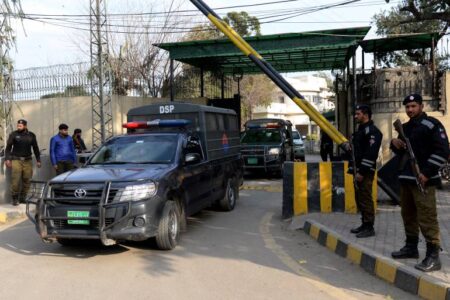
Pakistan sentenced three top Jamaat-ud-Dawa leaders for terror financing
A Pakistani anti-terrorism court has convicted three top Jamaat-ud-Dawa (JuD) leaders on terrorism-financing charges, a senior prosecutor says, as the country continues to crack down on armed groups operating on its soil.
Jamaat-ud-Dawa, a humanitarian relief and religious education organisation operating across the country has been designated a front for the Lashkar-e-Taiba (LeT) armed group by Pakistan’s government and the United Nations and has come under increasing scrutiny in Pakistan since 2018.
The three leaders, including deputy JuD chief Abdul Rehman Makki, head of fundraising Zafar Iqbal and media chief Yahya Mujahid, were convicted by a court in the eastern city of Lahore on Wednesday, prosecutor Abdul Rauf Wattoo told Al Jazeera.
“They have all three been convicted, all on charges of terrorism financing,” he said.
Iqbal and Mujahid were given prison terms of 15 and a half years each, while Makki was sentenced to six months in prison. All three remain in custody, with several other terrorism-funding cases pending against them, Wattoo said.
LeT is believed to have carried out the 2008 Mumbai attacks, which killed more than 160 people in coordinated gun and bomb attacks singling out hotels and public places in the Indian commercial capital.
Makki is the group’s deputy leader and is wanted by the United States in connection with that attack, with the US Treasury offering a $2m bounty for his capture.
Iqbal and Mujahid are both subject to United Nations sanctions for their affiliation with LeT and JuD.
Iqbal was a co-founder of LeT in the 1980s alongside Hafiz Muhammad Saeed, the group’s chief, who is also serving a prison sentence in Pakistan on terrorism-financing charges.
Iqbal has played a prominent role in JeD, fundraising and recruiting since 2008, according to the UN’s sanctions summary on his case.
Mujahid, meanwhile, has risen through the ranks in JuD, playing a prominent leadership role in the group alongside Saeed.
“Mujahid has issued statements to the press on behalf of the organisation on numerous occasions, including after the December 2001 LeT attacks on the Indian Parliament, and following the November 2008 attacks in Mumbai, India,” reads the UN sanctions summary on Mujahid.
Pakistan has stepped up arrests and prosecutions on terrorism-financing charges after revamping its anti-money laundering and anti-terrorism financing infrastructure in coordination with the Financial Action Task Force (FATF), an intergovernmental body that “grey-listed” the country in 2018 for non-compliance with international regulations.
In October, FATF noted that Pakistan had made “significant progress” in revamping its systems to deal with such crimes.
Source: Al Jazeera





